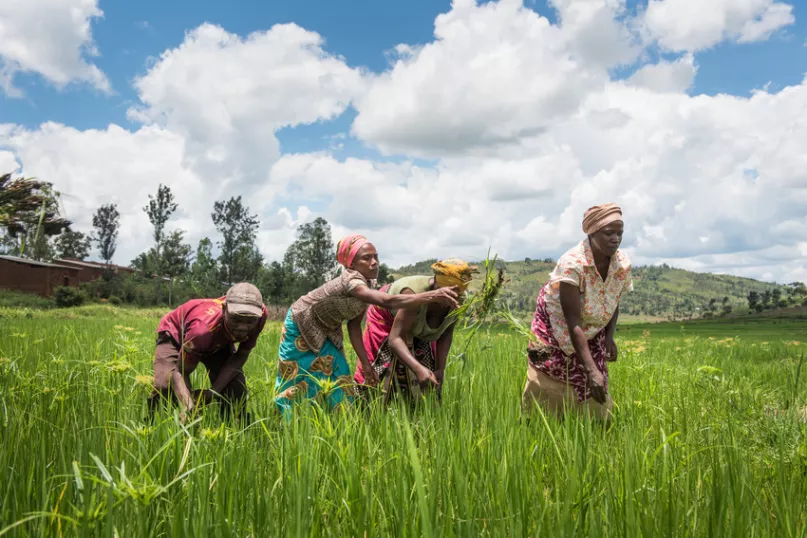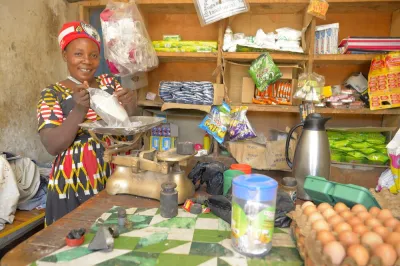How Can Microfinance Institutions Help Their Clients Build Climate Resilience?

While half of the world’s population now live in areas highly vulnerable to climate change, impacts vary widely. The human and economic cost of floods, droughts and storms is 15 times greater in highly vulnerable regions than in the least vulnerable, according to the latest Intergovernmental Panel on Climate Change (IPCC) report. And while adaptation planning is now widespread, implementation is unevenly distributed, with significant gaps, especially in getting climate adaptation financing to those in most need. Research suggests that only 10 percent of climate finance from dedicated climate funds gets to the local level.
Why MFIs?
Conscious of these challenges, As the previous blog post in this series argues, MFIs are well-placed to promote climate change adaptation products and services, given the close mapping between the future incidence of climate impact and the microfinance sector footprint across the globe. In addition, financial services are already a key tool for enabling resilience, and many large MFIs are the key provider of finance and other services such as training and agricultural extension services for many of the communities they serve.
Our experience with the COVID-19 pandemic showed how MFIs can perform a key role in building resilience to severe shocks among developing country communities. Since the start of the pandemic, Opportunity’s MFI partners in India, Indonesia and Nepal have provided training on COVID-19 prevention and management to 15 million people, while our Small Finance Bank partners in India ran over 30,000 vaccination camps, vaccinating over 3.8 million people.
The role of MFIs
So, what can MFIs do to support their clients in the context of climate change? First, we have to understand what clients really need. Recent research out of Rwanda, supported by Opportunity, is beginning to give us an idea. As our partners at Glasgow Caledonian University and the University of Rwanda discussed in the first blog post of this series, the research suggests scope for MFIs to make a much greater contribution to resilience by:
- Adapting policies, operational guidelines and practices to take into account climate change.
- Broadening the purpose of loans, particularly in the agriculture sector, and offering more flexible loan terms.
- Broadening access to financial services and providing training on climate mitigation and adaptation strategies, especially simple, cheap technologies and practices, for example in the management of water resources.
- Exploring new sources of financing from climate adaptation funds to support these changes.
MFIs can provide tailored, expanded and additional financial services
Our research in Rwanda and feedback from our Farmer Service Agent network indicates a few different ways in which existing financial products could be tailored to increase climate resilience:
- Introducing loans with longer terms (three years or more), to enable investment in assets where the return on investment does not accrue in the regular agricultural crop cycle: e.g., irrigation systems, sowing and harvesting equipment, post-harvest storage, transportation, tree-planting, and switching to new and more sustainable crops.
- Providing small, productive, agricultural microloans targeted at financially excluded and vulnerable groups of farmers, removing restrictions to lower income groups and farmers who are not part of existing farming cooperatives.
- Bundling loan and insurance products.
- Redesigning various aspects of loan products, such as disbursement, schedules, interest and penalties, in order to facilitate new products and ensure that existing loans are effective. For example, a recurring theme of our research is that reducing delays in disbursing credit is critical to ensure successful planting and harvesting.
At Opportunity, we are also exploring institutional disaster risk insurance to facilitate post-disaster emergency lending. Our partners in India are addressing supply and demand side constraints to livestock insurance with finance and technical assistance from the InsuResilience Investment Fund. And we are working through our Farmer Service Agent network in Africa to expand access to lending and low-cost insurance for smallholder farmers.
MFIs can provide non-financial services
Through their outreach in rural communities, MFIs can also provide non-financial services that aim to help clients build resilience and adapt to climate change, such as:
- Short and long-term weather forecast information.
- Market linkages and price regulation.
- Training to build the knowledge and skills needed to deal with erratic climate or climate change, such as agronomist advice on agricultural techniques or more sustainable agricultural strategies.
Through our Farmer Service Agent (FSA) network in Africa, we are expanding climate-smart technical trainings in planting techniques, irrigation, pesticides, crop rotation and storage. FSAs help farmers access accurate data on market prices, weather and yield forecasting via smartphone. FSAs also set up partnerships with agribusinesses to facilitate group purchase agreements for agricultural inputs, and sales agreements with local buyers.
Support needed for MFIs
To implement many of these strategies, MFIs will require additional and new types of finance, or even grant funding for the non-financial services. Patient capital and/or blended finance will be needed to extend loan terms for longer term investment and provide credit to more excluded and higher risk groups.
Additional finance alone will not be sufficient, however. A key element of these solutions is better understanding the needs of clients and communities at a local level. Beyond providing training and agricultural inputs that fit the local environment, Opportunity International is committed to designing solutions that empower local actors in climate solutions, and we are a signatory to the Principles for Locally Led Adaptation. Our call to action, therefore, would be to encourage FSPs to seek better understanding of client needs at a local level.
We also encourage investors and funders to recognize the advantageous position of MFIs to deliver financial and non-financial services to some of the most climate vulnerable stakeholder groups, and to take into consideration that many resilience needs require solutions that would be economically unsustainable under the standard microfinance model. Funders should provide patient capital, while encouraging partnership and a locally tailored approach.



MFIs should definitely intervene in order to have a constant offer of sustainable finance products, so as not to depend on short or medium-term projects. The challenge is to help in the market study and design of suitable products, together with awareness-raising and training processes. In Ecuador we are working with 10 savings and credit cooperatives in this sense, without any project support.
Great article, Calum! Learn't a lot.
Leave a comment